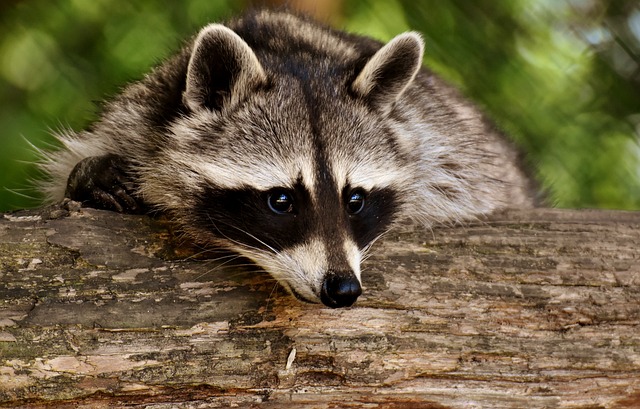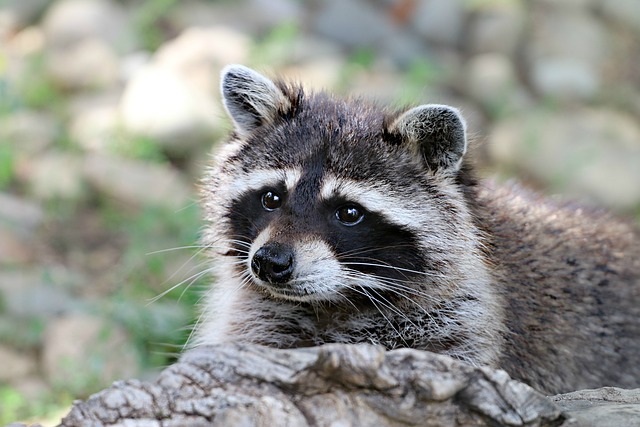Can Raccoons Get Rabies? Exploring the Dangers and Risks

Are raccoons susceptible to rabies? This question may have crossed your mind if you’ve ever encountered one of these curious creatures in the wild. In this article, we will delve into the dangers and risks associated with raccoons and rabies.
Understanding Rabies and Its Transmission
Rabies is a viral disease that affects the nervous system of mammals, including raccoons. It is caused by the rabies virus, which is primarily transmitted through the saliva of an infected animal, usually through bites or scratches. The virus targets the central nervous system, leading to inflammation of the brain and spinal cord.
Raccoons are considered high-risk carriers of rabies due to their frequent encounters with other animals. They are known to interact with various species, such as bats, skunks, and other raccoons, increasing their chances of exposure to the virus. While not all raccoons carry the disease, it is important to understand the risks associated with their potential infection.
Can Raccoons Get Rabies?
Yes, raccoons can get rabies. They are one of the most common carriers of the rabies virus in North America. However, it is important to note that not all raccoons are infected. The prevalence of rabies varies among raccoon populations and is influenced by factors such as geographic location and the overall health of the population.
Raccoons can contract rabies through close contact with an infected animal. This can occur during territorial disputes, mating encounters, or interactions with other species that carry the virus. Bites and scratches from an infected raccoon can transmit the virus, so it is crucial to be cautious when dealing with raccoons, especially those showing signs of illness.

Factors That Increase the Risk of Raccoons Getting Rabies
Several factors contribute to the increased risk of raccoons contracting rabies. One significant factor is the population density of raccoons in a given area. Higher population densities can lead to more frequent interactions among raccoons and other animals, increasing the likelihood of disease transmission.
Environmental factors also play a role in the spread of rabies among raccoons. Areas with a high concentration of wildlife, such as forests or suburban neighborhoods near wooded areas, provide ample opportunities for raccoons to come into contact with infected animals.
Additionally, raccoons that are malnourished or weakened due to other illnesses are more susceptible to contracting rabies. These individuals may have compromised immune systems, making them more vulnerable to the virus.
Signs and Symptoms of Rabies in Raccoons
Identifying the signs and symptoms of rabies in raccoons is crucial for your safety and the safety of your pets. While it can be challenging to differentiate between a healthy raccoon and one infected with rabies, certain behaviors and physical symptoms may indicate a potential infection.
Rabid raccoons often display abnormal behavior, such as aggression or unprovoked attacks. They may exhibit excessive drooling, disorientation, and difficulty walking. As the disease progresses, infected raccoons may experience paralysis and exhibit unusual vocalizations.
Physical symptoms of rabies in raccoons can include dilated pupils, loss of coordination, and a generally disheveled appearance. It is essential to remember that these symptoms can also be indicative of other illnesses, so it is best to avoid direct contact with any raccoon displaying these signs.
How to Prevent Raccoons from Getting Rabies
Preventing raccoons from contracting rabies is crucial for both their well-being and the safety of humans and pets. One of the most effective preventative measures is to avoid feeding raccoons or leaving food sources accessible to them. By removing potential sources of food, you can discourage raccoons from frequenting your property.
Securing trash cans with tight-fitting lids and eliminating any potential entry points, such as gaps in fences or open crawl spaces, can also deter raccoons from entering your property. It is important to note that raccoons are intelligent and resourceful creatures, so taking these preventive measures consistently is key.
What to Do If You Encounter a Potentially Rabid Raccoon
If you encounter a raccoon that you suspect may be infected with rabies, it is crucial to prioritize your safety and that of others. Do not approach or attempt to handle the raccoon. Contact your local animal control or wildlife management agency to report the sighting and seek guidance on how to proceed.
While it is natural to feel concerned about the welfare of the raccoon, it is best to let trained professionals handle the situation. They have the necessary equipment and expertise to handle potentially rabid animals safely.
The Importance of Rabies Vaccination for Pets
Protecting your pets from rabies is essential, as they can also be at risk of contracting the disease. Vaccinating your pets, including dogs and cats, against rabies is crucial for their health and well-being. Regular vaccination not only helps prevent the spread of rabies but also ensures the safety of your family and community.
Consult with your veterinarian to ensure that your pets’ vaccinations are up to date. By keeping your pets protected, you are taking an active role in preventing the spread of rabies and safeguarding their overall health.
Other Diseases and Risks Associated with Raccoons
While rabies is a significant concern when it comes to raccoons, they can also carry other diseases and pose additional risks. Raccoon roundworm, for example, is a parasitic infection that can be transmitted to humans and pets through contact with raccoon feces. It is important to avoid direct contact with raccoon waste and to practice good hygiene when cleaning up potentially contaminated areas.
Raccoons can also transmit other diseases, such as leptospirosis and canine distemper, to pets. These diseases can have serious health consequences for animals, making it crucial to prioritize preventative measures, including vaccinations and regular check-ups with a veterinarian.
Conclusion
Raccoons are fascinating creatures that can coexist with humans in urban and suburban environments. However, understanding the risks associated with raccoons and rabies is essential for your safety and the well-being of your pets. By being knowledgeable about the signs and symptoms of rabies, taking preventative measures, and ensuring that your pets are vaccinated, you can minimize the risks associated with raccoons and enjoy their presence responsibly. Remember to always prioritize your safety and that of others when encountering raccoons in the wild.
Must Read : Unraveling the Mystery: Can Reptiles Get Rabies?
What do you think?
Show comments / Leave a comment